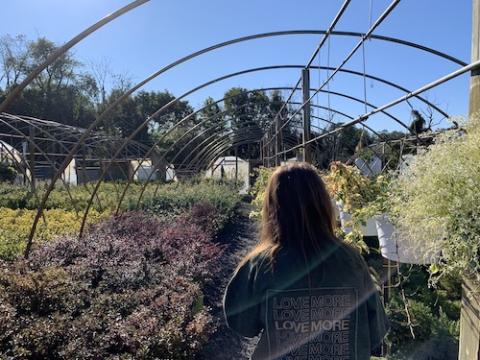
The Collier Transition Program is housed in the solar building on Collier High School's campus in Wickatunk, New Jersey. (Maddie Thompson)
Editor's note: Notes from the Field includes reports from young people volunteering in ministries of Catholic sisters. A partnership with Catholic Volunteer Network, the project began in the summer of 2015.
"Down the hill" is a phrase I frequently use to distinguish my work as a volunteer in Collier High School and in the Collier Transition Program.
Collier High School is a state-approved, private, nonprofit school for students with disabilities whose needs cannot be met within the public school system. A strong academic program and social services department work together to provide students with an environment for social and emotional growth. Collier provides small classes, serving students of all levels of academic ability and a wide range of IQs. Students with symptoms of depression, anxiety, isolation, defiant behavior, low motivation and school refusal as well as mood, attention or adjustment difficulties have all flourished in Collier's programming.
A half-mile down the hill from the high school lies the solar building that houses the transition program, which "serves students who have completed all of their high school graduation requirements but would benefit from support in enhancing their professional skills, college and/or vocational preparedness, and life-skills to increase independence and employability." But some days, it feels like I am crossing into a new world when I head down the hill into the transition space.
Advertisement
Working through times of transition challenges us to be creative, communal and celebratory people. Times of transition can be intimidating, especially when there is no clear end in sight. I am continually amazed by how the Collier Transition Program provides support, assistance, guidance and encouragement to students in this season of life.
The journey through this transition program looks as unique as each of our students. Some love the idea of manual labor, while others relish working at a computer. Many prefer limited contact with customers, while others seek social interaction. Instead of taking a straight path to get through times of transition, we often have to be scrappy and creative. We get through by climbing over, sliding around, going under and forging new trails.
The Collier Transition Program is tasked with asking students difficult questions regarding goal setting, college planning, job training and more. Students in this program are often at a crossroads. Much of my role as an aide in the transition program's career assessment course is to craft lessons or activities for the students. I take a deep breath before walking into the solar building, knowing that what I introduce will most likely be met with a form of resistance because for these students, thinking about the future can be intimidating. Yet I think about my own struggle in times of transition. Most of what I protest are the very routes that take me through to the other side.

A view from the Sisters of the Good Shepherd's convent looking "down the hill" to where the Collier Transition Program is located on the campus of Collier High School in Wickatunk, New Jersey. (Maddie Thompson)
When the transition students fill out assessments, they grapple with tough questions about the future, questions that continue to stump me. I invite the students to laugh at questions that might seem irrelevant, such as: "Would you enjoy working at a fish hatchery?" Yet I also challenge them to answer questions with imagination, such as: "Would you enjoy managing or supervising a team of individuals?" At the moment, many students do not know for what type of team they would want to work. To imagine yourself so confident in your talents that you could lead and direct others takes courage and creativity.
Knowing that no assignment or activity will speed up this time of transition, I believe these tasks can plant seeds for future growth. Self-reflection is difficult work that cannot be avoided or rushed. Each time students name their strengths, weaknesses, interests and goals, they take steps of bravery toward forging their own path.
I am often overcome with emotion when I think of what some of our students have experienced, what they carry onto campus each day, and what they face after leaving here. For a student to have a hypothetical backpack full of things beyond their control is an injustice. Many times, it feels unfair to ask more of our students — to browse different careers, college courses or apartments. Yet I am continually reminded by the incredible staff here at Collier that we care for our students by refusing to let the uncontrollable blur their potential. We love them by working with them to take ownership of what is in their control.
Transition is not permanent, nor is it a linear path. We need support, community and hope. Spaces of transition can be dark, bleak and seemingly never-ending; however, it is here where we can encounter the beauty of creativity, community and the unknown. In transition, we discover new interests, refine old skills, hope, daydream and imagine. If we can learn to dream, create and apply ourselves during times of transition, we will be unstoppable when we step into spaces of confidence and security.

Former Good Shepherd volunteer Christina Hardebeck is the Collier Transition Program manager. She's pictured here walking through a nursery at a local farm on a fall day. (Maddie Thompson)
In times of transition, most tasks can feel impossible because we do not think ourselves worthy to dream. At Collier, I choose to celebrate what appear to be small successes alongside the staff and students. These are the stepping stones to a life of freedom, independence and a self-defined version of success.
Every day, we make difficult decisions to move just a little: getting out of bed in the morning, going for a walk, turning in an assignment, asking for help, opening a job application, applying to college, and the list goes on. When we celebrate these small things in life, we convert them into big things. Why not give ourselves and our successes the applause we deserve? At Collier, we celebrate the small things in big ways.
I do not mean to downplay the outbursts of deep sadness, door-slamming anger, loneliness and more that fill times of transition and set up camp in the Collier solar building. However, I do mean to celebrate the small moments that fill the cracks in between the chaos. These are the moments when students and staff choose vulnerability over avoidance, cooperation over braving it alone, or one small step over refusing to move.
The Collier Transition Program creates a space where students do not have to grapple alone with big, heavy life questions and next steps. We do the uncomfortable, the scary and the awkward alongside a cohort — staff and students sharing their life experiences for the collective whole to keep moving forward, one step at a time.
I applaud the transition students for taking the next step. Whether it is logging on to Zoom or walking through the solar building door, they are in motion and heading somewhere. What an absolute gift it is to support them in their discovery of where that somewhere may be and what that somewhere may hold.

A small bounty of bright flowers and vegetables springs up from the ground at Caramore Farm on Collier High School's campus in Wickatunk, New Jersey. (Maddie Thompson)
[Maddie Thompson is a Good Shepherd Volunteer serving at Collier High School in New Jersey.]






